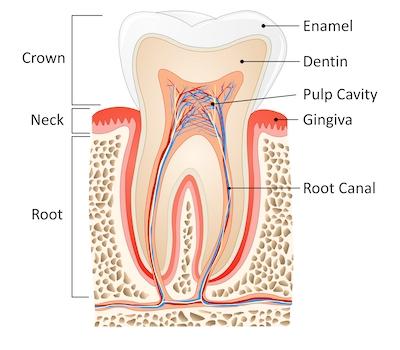
Dental emergencies happen to most people at least once, but you can quickly lower your risks for most emergencies.
- Visit your dentist twice annually for checkups and dental cleanings.
- Brush and floss your teeth after every meal or at least twice daily.
- Wear a fitted mouthguard or the correct face gear when competing in sports.
- Talk to your dentist if you suspect bruxism (teeth grinding and clenching).
- Report oral health changes to our team as soon as possible.
What Is Emergency Dentistry
Emergency dentistry is urgent care for your teeth, gums, and surrounding tissues. The goal of emergency dentistry in Philadelphia is to eliminate pain and restore oral health.
There are many different types of dental emergencies, and it’s impossible to think of them all. But as a rule, if you have oral pain, swelling, or an injury limited to the mouth, we consider it a dental emergency.
Dental emergencies may include one or more of the following symptoms:
- Toothache or increasing sensitivity throughout the day or evening.
- Gum, jaw, or face swelling can be key signs of oral infections, which are always emergencies.
- Injuries to teeth, gums, or oral tissues, especially isolated injuries.
- Broken or lost teeth, restorations, or prosthetics, the latter two, especially if there is pain and swelling.
What Is the Most Common Dental Emergency?
 The most common issues our emergency dentist in Philadelphia sees are tooth canal infections. Typical signs include toothache and swelling.
The most common issues our emergency dentist in Philadelphia sees are tooth canal infections. Typical signs include toothache and swelling.
The only way to treat this type of infection is through root canal therapy. A root canal involves numbing the treatment location, extracting the infection, and flushing the canal. We then seal the tooth temporarily. At a later appointment, you come in for a permanent filling or dental crown.
We only recommend fillings for smaller root canals. The infection typically weakens the tooth structure, putting it at risk for loss. The dental crown, which is a cap, fits over the tooth to the gumline to protect against future damage. The crown is crafted to look like neighboring teeth.
How Can You Tell if a Tooth Infection Is Spreading?
It’s essential to contact the dentist when you first notice pain or swelling. Without treatment, oral infections can spread quickly and put other teeth at risk. Typically, you’ll notice the infection spreading because your symptoms are worsening. Mild pain and swelling will escalate as the infection progresses.
How Long Can a Tooth Infection Go Untreated?
A festering root infection should not go untreated for more than a day. Without intervention, the pain can be severe and the swelling significant. Choosing not to see the dentist will result in the loss of the tooth and may jeopardize neighboring teeth.
What Happens at An Emergency Dental Appointment?
At your emergency visit, our compassionate team acts quickly to assess your emergency and start treatment. We want to ease your pain as soon as possible.
What happens during your visit depends on the nature of your emergency. But rest assured; we will stabilize your situation and work to restore your oral health.
Can You Save a Knocked-Out Tooth?
In some cases, your Philadelphia dentist can reset your tooth into the gum, provided you seek treatment in a timely manner.
It’s essential to collect the tooth, be careful not to handle the root, and place it in a cup of milk or saliva until your dental appointment.
What If My Tooth Cannot Be Saved?
If you break your tooth below the gumline, or it splits, the dentist may recommend tooth replacement. We offer various options in our dental office, including:
- Dental implants
- Partial dentures
- Dental bridges
 What Can an Emergency Room Do for a Tooth?
What Can an Emergency Room Do for a Tooth?
Unfortunately, your local emergency room cannot do much for your dental emergency, and they don’t have the capacity to save a tooth.
Fortunately, our dental office treats emergencies regularly and offers extended hours and are here seven days per week to ensure you get the care you need. And we accept CareCredit, Scratch Pay, and Sunbit. Additionally, we work with flexible spending programs and health savings programs through your employer.
However, if you’ve sustained trauma to the head or body, we want you to go to your local emergency room as soon as possible. You can contact our team after you’ve been assessed by the ER doctor. Your safety is a top priority!
Same-Day Dental Emergencies Near Me
We specialize in general dentistry and dental emergencies and offer tooth replacement options to keep your smile healthy. To learn more or to arrange a visit with the dentist, call us today.
